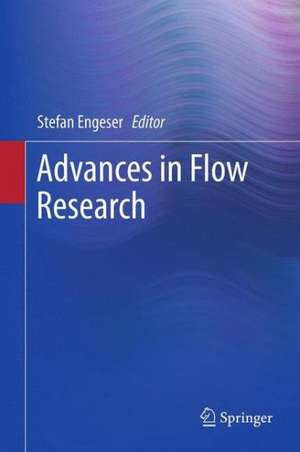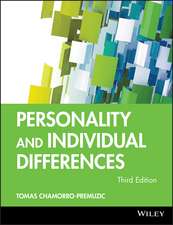Advances in Flow Research
Editat de Stefan Engeseren Limba Engleză Paperback – 12 apr 2014
Preț: 581.79 lei
Preț vechi: 684.46 lei
-15% Nou
Puncte Express: 873
Preț estimativ în valută:
111.33€ • 116.47$ • 92.48£
111.33€ • 116.47$ • 92.48£
Carte tipărită la comandă
Livrare economică 03-17 aprilie
Preluare comenzi: 021 569.72.76
Specificații
ISBN-13: 9781493901739
ISBN-10: 1493901737
Pagini: 252
Ilustrații: XVIII, 234 p.
Dimensiuni: 155 x 235 x 17 mm
Greutate: 0.36 kg
Ediția:2012
Editura: Springer
Colecția Springer
Locul publicării:New York, NY, United States
ISBN-10: 1493901737
Pagini: 252
Ilustrații: XVIII, 234 p.
Dimensiuni: 155 x 235 x 17 mm
Greutate: 0.36 kg
Ediția:2012
Editura: Springer
Colecția Springer
Locul publicării:New York, NY, United States
Public țintă
ResearchCuprins
- Historical lines and overview of current research.- A closer look at methodological approaches.- Factors predicting flow experience.- Flow, motivation and performance.- Flow in a non-achievement situation.- Flow as a feeling of oneness.- The dark side of the moon: negative aspects of Flow.-Neuropsychological correlates of flow experience.- Autotelic personality.- Theoretical integration and future lines.
Recenzii
From the reviews:
“Advances in Flow Research presents a collection of chapters by impressively talented researchers in the area of flow theory. It merits close reading by all those interested in research on flow, happiness, and other related topics in the field of positive psychology. … Advances in Flow Research is a major contribution to the research literature on flow theory. It surveys and rigorously describes an imposing quantity of psychological research and deserves a wide readership.” (David Manier, PsycCRITIQUES, Vol. 58 (5), January, 2013)
“Advances in Flow Research presents a collection of chapters by impressively talented researchers in the area of flow theory. It merits close reading by all those interested in research on flow, happiness, and other related topics in the field of positive psychology. … Advances in Flow Research is a major contribution to the research literature on flow theory. It surveys and rigorously describes an imposing quantity of psychological research and deserves a wide readership.” (David Manier, PsycCRITIQUES, Vol. 58 (5), January, 2013)
Textul de pe ultima copertă
Since its discovery as a mental state in the 1970s, flow—the losing of oneself in productive activity—has become an important aspect of positive psychology and motivation research. Its processes have been studied in artists and athletes, applied to education and business, and explored in pursuits as varied as spirituality and internet use. As more analysis is done on optimal states of being, the more interest flow gathers as a focus of inquiry.
In Advances in Flow Research, a panel of experts expands on Csikszentmihalyi’s classic flow model and opens out key concepts. Contributors address ongoing questions regarding the conditions and components of flow, and consider various methods for measurement and assessment. Current findings are included on flow-related cognitive and personality issues, and the relation of flow to happiness and other affective states. And readers are introduced to emerging areas of study, including possible contributions of flow to negative behavior. Among the topics covered:
In Advances in Flow Research, a panel of experts expands on Csikszentmihalyi’s classic flow model and opens out key concepts. Contributors address ongoing questions regarding the conditions and components of flow, and consider various methods for measurement and assessment. Current findings are included on flow-related cognitive and personality issues, and the relation of flow to happiness and other affective states. And readers are introduced to emerging areas of study, including possible contributions of flow to negative behavior. Among the topics covered:
- Affective, cognitive, and performance-related consequences of flow.
- Psychophysiological correlates of flow experience.
- Understanding the autotelic personality.
- Integrating flow theory and cognitive evaluation theory.
- Flow in non-achievement situations.
- The dark side of flow.
Caracteristici
Presents the newest developments in Flow research
Includes critical methodological and theoretical examination of the Flow experience
Presents highlights of critical examples and definitions
Includes supplementary material: sn.pub/extras
Includes critical methodological and theoretical examination of the Flow experience
Presents highlights of critical examples and definitions
Includes supplementary material: sn.pub/extras








